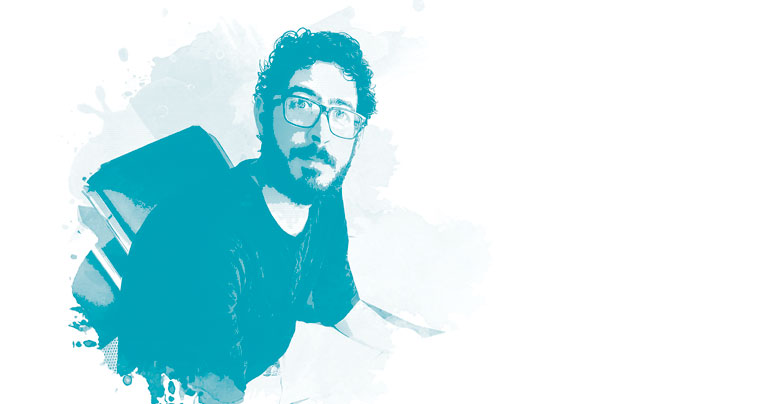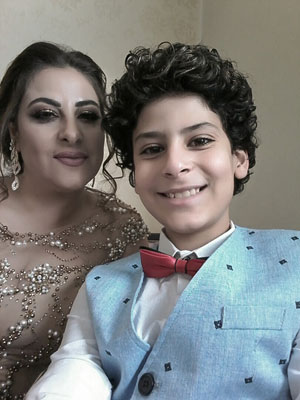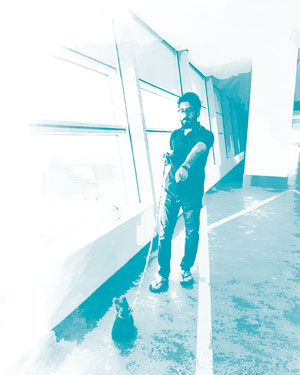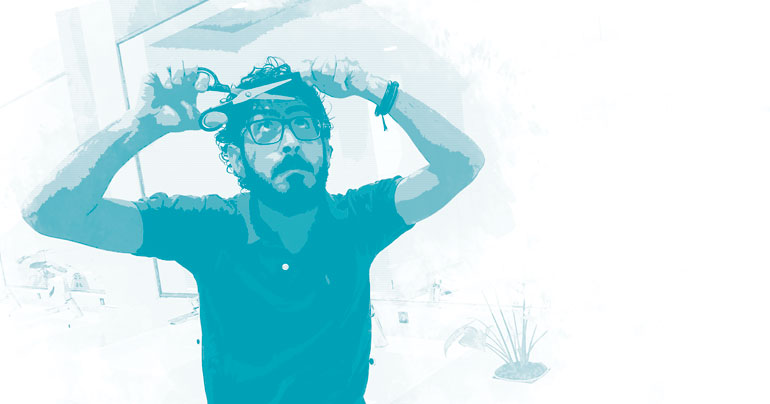Syrian Hassan al-Kontar had been living in Kuala Lumpur International Airport for more than half a year before Malaysian police arrested him with plans to deport him back to war-torn Syria. No country wanted to take him in when he found himself stranded. He lived without papers in an unreal place, hoping for a miracle, and now his very life is on the line
Before his arrest and deportation in October at the hands of Malaysian authorities, Hassan al-Kontar spent 208 days trapped at Kuala Lumpur’s airport, in the northwest wing of Terminal 2, in the transit hall of the low-cost airlines. For more than half a year, Hassan lived in suspended animation, caught between a brutal civil war in his home country of Syria and a faceless international bureaucracy that left him stranded in an airport arrivals lounge just 300 metres from freedom. This is his story.
Under a blanket, next to the escalator to the international departure gates, he sits, his backpack and suitcase next to him like a barrier against the world. It’s morning, but in the terminal’s neon light, which is always the same, the morning is recognised only by the sound of the departure board. He reads a book; he has just dreamed himself away. He looks up, disappointed that the dream is over; tired brown eyes, the pale skin of a man who has lived for months in a place where it’s never night-time and the sun never rises, where there is no wind or silence.
All exits from the place he called home lead to border guards who want to see a valid passport, a piece of paper that means the world. Hassan does not have this paper. His visa has expired, no country will accept him. There is no exit for him, no more decisions. He lives at a dead end, all options a thing of the past.
“It could be worse,” says Hassan — and, with the strange words hanging in the air, quickly adds: “Coffee?” He smiles. With his beard, sandals and hooded sweater, he could be a hipster on his way to Southeast Asia rather than a homeless man who cuts his hair in the men’s room and dabs the cold water off his body with paper towels. Melbourne, reads the departures board. Jakarta, Singapore, Hong Kong, each name a picture in the head, a destination for people who hurry past but have no time for him. He no longer pays attention to them.

Hassan hides here under the stairs, in the darkest corner of the terminal, because he has become a story in which he is trapped in the same conversation with every traveller who recognises him: Oh, he is the man who lives here? Yes. Where does he sleep? Under the stairs. And what does he eat? Airline food, three times a day. Oh, God! Yes, oh, God. Isn’t it terrible to live in the airport? Yes, it is. Is that allowed at all? Yes, it is. And these constant announcements that no one understands? Yes, they are bad. Does he know this film starring Tom Hanks about a man who also lives in the airport? Yes, he does. He was funny, wasn’t he? Uh, sure. And where does he wash himself? In the disabled toilet, there’s a little more room. Why doesn’t he just fly away, to Mexico or something? Because that is not possible without a visa. How long does he have to stay here? Maybe one or two years. That is terrible! Yes, it is.
A flight attendant recently approached him. He thought she was quite nice. She beamed at him: “Hey! I know you from the news. How are you?” Such moments elicit his sarcasm: “I am really well, you wouldn’t believe how beautiful life is!” “Are you still stuck at the airport?” “Nah, they already let me out, but I came back yesterday of my own free will.” “Why?” “I missed the place.” When he sees her now, the flight attendant no longer smiles when she passes by, and it annoys him, reminds him that he’s not merely passing through the airport on his way to nice places, friendly people. He introduces his girlfriend, a cardboard display of a stewardess at passport control, as “Angelina”.

Hassan rises from his camp, stretches himself. The morning planes have just departed to Phuket and Labuan. A follower on Facebook has brought him instant coffees in small plastic bags as he traveled through. Hassan guards them like treasure. His freedom ends 300 metres from his camp, between the arrival gates and passport control, the worst corner of the whole airport to live in. No cafe, no bookstore, no snack bar. Only three mobile phone stands and a counter for transit passengers.
Hassan says his childhood smelled of his mother’s fresh bread, of vine leaves and mint, bulgur dumplings, minced meat and onions, coffee, the pages from his father’s library — the smell he loved the most. His father read him poems, Russian novels and history books. Hassan thought how exciting the world was. At night he heard wolves howling and hyenas screaming in the Druze Mountains. After his studies, he had to make up his mind: Does he want to stay in Syria, take over a government office, build roads, become an engineer like his father? Or does he choose adventure and, like many young Syrians, go to work in Dubai looking for happiness? In 2006, Hassan was 25 years old, and Syria seemed to him too peaceful, too beautiful. I’ll be back soon, he told his parents.
When the plane turned over the Persian Gulf, Hassan saw a city like a promise, full of glittering towers. Every morning he put on his white shirt, his tie, and went to his office to sell insurance. In the evening, he went to the big bay of the city, smoked a hookah on the beach, took out his fishing tackle, saw the moon and was happy. He fell in love. He bought a red car. He wanted to make a career in Dubai and start a family. Life is good to me, he thought. In 2011, when Hassan was 29 years old, the war in Syria began. The embassy in Dubai told him that the 21 months of his military service would begin now. “This is not my life,” says Hassan today.
At the terminal in Kuala Lumpur, the last call for the flight to Hyderabad sounds through the loudspeakers. Don’t leave your luggage unattended. The Hong Kong gate opens. Time for lunch. For the first few months, Hassan picked up food from the low-cost airline Air Asia at the transfer desk. Chicken with rice, shrink-wrapped in plastic, covered with aluminium foil. He ate it for breakfast, lunch and dinner. He can’t stand it anymore. Now he bribes the cleaning crew from time to time. He still has some money left, but sometimes a Canadian aid organisation transfers something to him. He does not accept alms from travellers.

In a corridor, he finds a man in a blue uniform. They see each other every day, but don’t know each other’s name. Hassan hands him small bills, 16 Malaysian ringgit, the equivalent of about three euros. “Burger, Pepsi?” the man asks. These are the only words he says. He grins. He knows he doesn’t have to offer him variety, because Hassan is dependent on him. Only one floor above them, in the departure hall, there is everything: McDonald’s Starbucks, medicine, books and much more than burgers and soda. But Hassan can’t get there without a passport. He has tried to order something other than burgers from the cleaners, showed them pictures on his phone, tried a dictionary, but they never seem to understand. So always burgers. He keeps the ketchup packets for bad times.
Hassan believes that if the war hadn’t broken out, he would still be living in Dubai. He would sell insurance policies and drive home to his family in his red car. But there was a work permit only with a valid visa, a visa only with a valid passport and the passport only for military service. But why should he destroy his home? He decided to wait. The war is already over, he thought. He lost his visa, his job, his apartment. He sold his car, his fishing rod. When warheads with poison gas were shot at residential areas in Syria, when President Bashar al-Assad bombed Aleppo, Hassan worked in the sandy desert of the Arabian Peninsula as a moonlighter, setting up solar panels far outside the city, where nobody asked questions. He dragged cables through the sand, rolled into his sleeping bag in the evening and thought of home. When the police finally caught him at a checkpoint, he was almost grateful.
They deported him to Malaysia, where Syrians get a visa at the airport. When the Syrian army launched a new offensive in late 2017, Hassan ran from snack bar to snack bar in Malaysia working as a kitchen assistant. After three months, this visa expired too. He bought a ticket to Ecuador, but the airline didn’t let him on the plane. He bought a ticket to Cambodia, but the country sent him back. In Malaysia, he could not get through passport control without a valid visa. He had now become the flotsam of international law, washed up in the transit zone, in the shadows between borders, a modern Robinson Crusoe.

Hassan recalls being 11 years old and sitting under the olive trees his father had planted. The light shone through the leaves onto the red soil. He heard the ripple from the water pump behind him. That summer morning, they had brewed fresh coffee and drunk it on a wooden bench when his father held him to a promise. “No matter what happens, never sell the farm, do you hear?” Hassan was silent as he thought about an answer that would make his father happy. “For no gold in the world,” he finally said. Then they went into the field to work. This is the picture that comes when he closes his eyes.
On the first day at the airport, Hassan thought it would take a few hours, then the matter would clear up. There had to be a way out. He wrote emails to all the countries that had already taken in Syrians: Germany, Sudan, Turkey. He wrote to all the airlines, to the UN, to his mother. That should be enough, he thought, and tried to rest. On the metal chairs, he tried to find a comfortable position, but that didn’t work. But he didn’t really care, and at some point, when the tiredness got bigger than the pain, he fell asleep. He woke up to an announcement that you shouldn’t leave your luggage unattended.
By the third day, most of the people he had written to hadn’t answered. His mother didn’t know what to do either. He soon found out that Malaysia was one of the few countries that had not signed the Geneva Refugee Convention, that there was no possibility for him to apply for asylum — and that he was not a stateless person because his state still existed. That was the moment Hassan realized he was stuck here — for weeks, months, maybe years.
‘Tom Hanks knows what it’s like,’ he says, as if the actor were his soul mate who slept a few gates away
Later in the afternoon, at the gate, Hassan watches The Terminal, a film in which Tom Hanks plays Viktor Navorski, from the fictitious state of Krakozhia, stranded at a New York airport because civil war has broken out in his country. “America closed,” the airport security chief tells Navorski. It’s a parable of a homeless man in a hostile world. Hassan knows all the good parts of the movie, and has seen it so many times that he can recite dialogue from it. “Tom Hanks knows what it’s like,” he says, as if the actor were his soul mate who slept a few gates away. In the film, Navorski wins a lot of friends, falls in love with a stewardess played by Catherine Zeta-Jones and finally defeats the evil head of security. The airport is a place full of secrets, companions, affairs. But Hassan has no Catherine Zeta-Jones here, no friends, no shopping mall and no Steven Spielberg. “This is the true story,” he says. His life is not a script.
On the fifth day in the terminal, Hassan decided to help himself. He had nothing on him except a pair of socks and his cellphone. He signed up for Twitter and wrote: “My name is Hassan. I am from Syria.” He also typed the hashtags “#love”, “#war” and “#help”. Two people followed him in the beginning, then a few hundred; now, he has more than 17,000 followers. On his 22nd day, he wrote to Tom Hanks saying that he felt alone. On his 40th day, someone brought him a collapsible mattress. Another brought a coffee mug, a third a change of clothes, a fourth a towel. A small Arab newspaper wrote about him, then the Guardian. A Canadian aid organisation promised to get him a job in a Vancouver hotel if he ever got there. They have applied for a visa for him, but it takes one to two years, says Hassan. It’s his best option.
[manual_related_posts]
Hassan lies pressed tightly against the glass pane, sleep goggles pulled over his eyes. He snores, he wakes up again and again — nobody can really sleep here. In a dream, he is about to finally board a plane, but just when he is about to put his foot on the plane, he has to go back under the crunching escalator, into limbo.
At some point, says Hassan, the war will be over. His father has died, the olive trees on the farm have almost dried ups but recently his family got the old pump going again. They have not sold the farm. At some point, Hassan believes, he will return to start all over again.
A few steps away, a Malaysian official is working at passport control. He looks friendly. When he is asked about Hassan al-Kontar, he blinks and asks: “Who?” Doesn’t he know Hassan al-Kontar, the man who has been living under these stairs next to him for more than half a year? “This is Terminal 2,” says the man. “How can I help you?” It’s like Hassan al-Kontar is being erased from the world, as though if you ignore him, the problem disappears. Hassan gets smaller and smaller and eventually disintegrates.
© 2018 Spiegel Online Distributed by The New York Times Syndicate
This article was published in the November 2018 edition of Southeast Asia Globe magazine. For full access, subscribe here.


